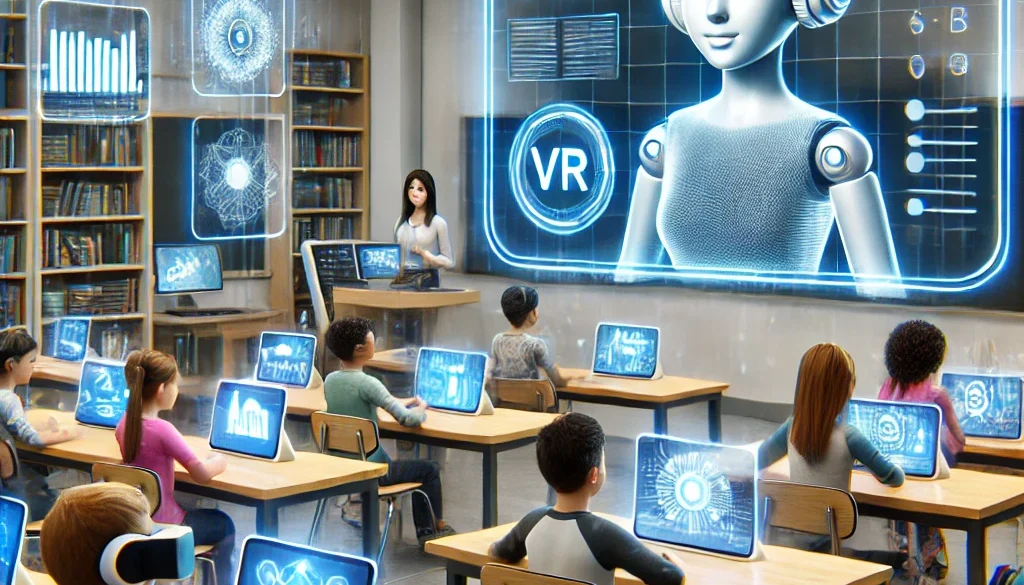The Importance of AI in Education: Revolutionizing Learning for The Future
Introduction
The 21st century is all about AI and technology. Almost a couple of decades back the very concept of Artificial Intelligence (AI), and its application was quite fictitious but now it has transformed the way of life we live right now. Not only in one field but the fragrance of its outstanding and surprising abilities is expanding rapidly.
The importance of AI in education is great. It is transforming education by enhancing learning experiences, improving accessibility, and streamlining administrative tasks. Every student’s learning and grasping speed varies. To cater to this problem, with AI-driven solutions, students can receive personalized education, and educators can optimize their teaching methods. So let’s dive deep into this article and we will be sharing insightful thoughts on the Importance of AI in Education, its application, and more.
Table of Contents
What is AI?
In simple words imagine AI as a super smart helper. The only difference between a human helper and a super smart helper is that the latter solves problems very fastly and efficiently taking care of accuracy that too without having coffee breaks!
In technical terms, Artificial intelligence is a software program that perceives its environment, processes information and takes actions to achieve specific goals. It is just a stack of codes running on commands.

Why AI is Important in Education
AI has a great role to play in education and learning. Learning has to be fun and easy and here comes AI that has transformed the way things were taught earlier.
1. Learning made Fun.
So AI has transformed the old traditional with new cool and attractive techniques. With the introduction of AI in education, learning for kids has been made easy as it integrates fun with education that binds children to learn.
2. Personalized Learning for Every Student
All fingers in our hands are not of the same size, likewise, all children in a society do not have the same mental abilities. Some grasp things faster while others slowly as every folk on the earth has their way of perceiving things around them. Teaching them in their style of convenience will be a better option, aggravating and enhancing their skill. But traditional education follows a one-size-fits-all approach, hence AI enables customized learning paths. AI analyzes students’ strengths, weaknesses, and learning styles to provide personalized recommendations, improving retention and engagement.
3. AI-Powered Tutoring and Support
Children with smaller age groups are considered the most curious minds. Tons of questions hovering over their mind need to be answered. With a physical teacher, it is not possible to be available all the time but AI-driven virtual tutors are available 24/7, helping students with queries, explanations, and step-by-step guidance. These systems use natural language processing (NLP) to enhance interaction, making learning more accessible and efficient.
4. Automated Grading and Feedback
Nowadays AI bots are used to automate the grading process for objective and subjective assessments, saving educators valuable time. With AI students can find their weak topics and prepare well. Plus instant feedback and guidance allow students to learn from mistakes and improve their performance more effectively.
5. Smart Content Generation
One of the major setbacks of the traditional education system is that they lack providing skill-based education but now the integration of AI in education has transformed it to a large extent. Schools are integrating coding, finance, and practical skills. AI assists in creating interactive learning materials, quizzes, and study guides. Moreover, platforms like Duolingo and Quizlet use AI to adapt content based on individual progress, making learning engaging and effective.
6. Enhanced Student Engagement
Now again there is a win for the modern education system as AI incorporates gamification, adaptive learning, and interactive tools to keep students engaged. The more students are engaged the more they learn. AI-powered chatbots provide instant assistance, making the learning process smoother and more enjoyable.
Following is a simple game created with the help of AI by our team. This game is based on the theme of Dinasorus where you will have three lives. Certain questions about maths will be asked. Wrong answers will end the lives in the game while correct, increasing your score. Playing such games will create engagement in studying making it more fun and easy to learn.
Dino Math Dash
If you want to check our other tools then CLICK HERE
7. Improved Accessibility for All Students
AI-powered tools are helping children with disabilities or language barriers with tools like text-to-speech, speech-to-text, and real-time language translation
8. Data-Driven Decision Making
There are many categories of AI agents, certain catered to education are programmed in such a manner that they analyze vast amounts of student performance data to identify learning patterns and areas for improvement. With such tools, educators can use these insights to refine teaching strategies and offer targeted support.
9. Streamlining Administrative Tasks
In the olden days, attendances were recorded in files with pen and paper, nowadays AI has made it possible to automate administrative processes like attendance tracking, scheduling, and performance monitoring, allowing educators to focus on teaching and mentoring students.
Advantages of AI in Education
So to conclude AI has an abundance of roles to play in education:-
1. Personalized Learning for Every Student.
2. Learning made fun.
3. AI-Powered Tutoring and Support
4. Automated Grading and Feedback
5. Smart Content Generation
6. Enhanced Student Engagement
7. Improved Accessibility for All Students
8. Data-Driven Decision Making
9. Streamlining Administrative Tasks

Challenges of Implementing AI in Education
- Data Privacy and Security: While switching online there is always a threat to data privacy and security. Its mandate to ensure student data remains secure and private is a major concern.
- High Implementation Costs: Training AI to integrate in a specific field requires a handsome investment in technology which might remain inaccessible to certain groups of students with weaker financial records. Integrating AI requires significant investment in technology and training.
- Bias in AI Algorithms: Biased answers by AI are not recommended as they lead to misinformation manipulation and even unfair decision-making. To understand let us take a simple example:-
Imagine a magic robot teacher who helps students with homework but is only trained on books from one country. If a student from another country asks a question the robot will simply ignore it or give wrong answers. So this is why AI should be unbiased.
- Reducing Human Interaction: While AI enhances education, it should not replace essential teacher-student interactions.
Disadvantages of AI in Education
A s every coin has two sides likewise integration of AI in education has some pros and cons.
- There is always an issue with data privacy and security.
- Training AI requires high investment which might not be affordable to minors.
- Bias in AI algorithm
- AI reduces human interactions.
Future of AI in Education
- AI-Driven AR/VR Learning: This is the most beautiful experience when AI is combined with Augmented Reality (AR) and Virtual Reality (VR) to create immersive educational experiences. AI-driven AR learning will boost engagement indirectly enhancing the quality of education.
- Emotional AI for Better Engagement: Some AI systems will analyze students’ emotions to tailor teaching methods.
- AI for Lifelong Learning: AI-powered platforms will enable continuous learning and skill development beyond traditional education.
- Blockchain and AI Integration: AI will work with blockchain technology to ensure secure academic records and certifications.
Conclusion
The importance of AI in education cannot be overstated. AI enhances learning, personalized education, and streamlines operations, benefiting both students and educators. While challenges exist, the future of AI in education holds immense potential to make learning more effective, engaging, and accessible for all.
FAQs
1. Why is AI important in education?
AI personalizes learning, automates tasks, and improves accessibility, making education more efficient and engaging.
2. Can AI replace teachers?
No, AI supports teachers by handling repetitive tasks, but human interaction remains crucial for effective education.
3. What are the challenges of using AI in education?
Challenges include data security, high costs, bias in algorithms, and balancing technology with human interaction.
4. What is the future of AI in education?
AI will power immersive learning, personalized education, and lifelong skill development, shaping the future of education.




